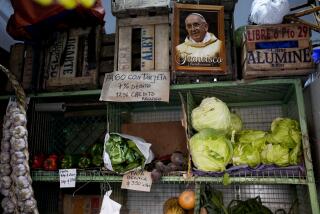Argentina’s Bankers Still Cautious
- Share via
BUENOS AIRES — Argentina’s bankers sounded a cautious note Wednesday after the government partially eased a 9-month-old banking freeze, allowing savers to withdraw billions of pesos from their deposits.
Economy Minister Roberto Lavagna announced Tuesday evening that Argentines would be allowed to withdraw as much as $1,940 from higher-rate, longer-term accounts, known as term deposits, as of Oct 1.
Banks also will let savers withdraw as much as $2,770 from their term deposits. Lavagna said the new measures would let 60% of funds in term deposits be removed from the banking freeze, which was introduced in December to stem a run on deposits.
Lavagna also offered savers the chance to swap the deposits that will remain frozen in the banking system for 10-year government bonds or private bank debts--the second part of a bond-for-deposits swap begun in July.
Wednesday, Cabinet Chief Alfredo Atanasof dismissed fears that Argentines quickly would convert freed-up pesos into dollars. Such a move would weaken the already devalued currency, fuel inflation and rattle the nation’s shaky banks.
Yet while the government was bullish about the effects of easing the restrictions, bankers were cautious.
“I’m sure the government wants to see what direction Argentines take with their cash ... if they’ll turn to buying dollars or buying goods,” said Jose Barrionuevo, director of Emerging Market Strategy at Barclays Capital. “Money is going to leave the banks. The question is, where will it go?”
The government believes there are economic signs that Argentines won’t use the money to buy dollars.
First, the currency has held steady at 3.60 pesos per dollar for three months, despite losing 70% of its value from January to May. Recently introduced exchange controls could firm up that stability.
Second, since mid-July Argentines have put more money into banks than they’ve withdrawn.
But Mario Vicens, president of the Argentine Banking Assn., said that while easing the banking freeze could be the first step in rebuilding Argentina’s financial system, success hinges on how the government handles other political challenges.
“If things remain calm ... and all the players in the current situation act responsibly, then this will end successfully,” Vicens told local news agency Diarios y Noticias.
But Argentine politics haven’t been calm of late.
Daily street protests by those with money trapped in the banks, feuding in President Eduardo Duhalde’s Peronist party ahead of March elections and threats by lawmakers to impeach Supreme Court justices created a volatile political situation.
Argentina has been in recession since 1998. The economy is expected to contract about 15% this year, according to private studies, and the unemployment rate stands at 21.3%. In December, the country defaulted on a record $141-billion public debt.
More to Read
Sign up for Essential California
The most important California stories and recommendations in your inbox every morning.
You may occasionally receive promotional content from the Los Angeles Times.













